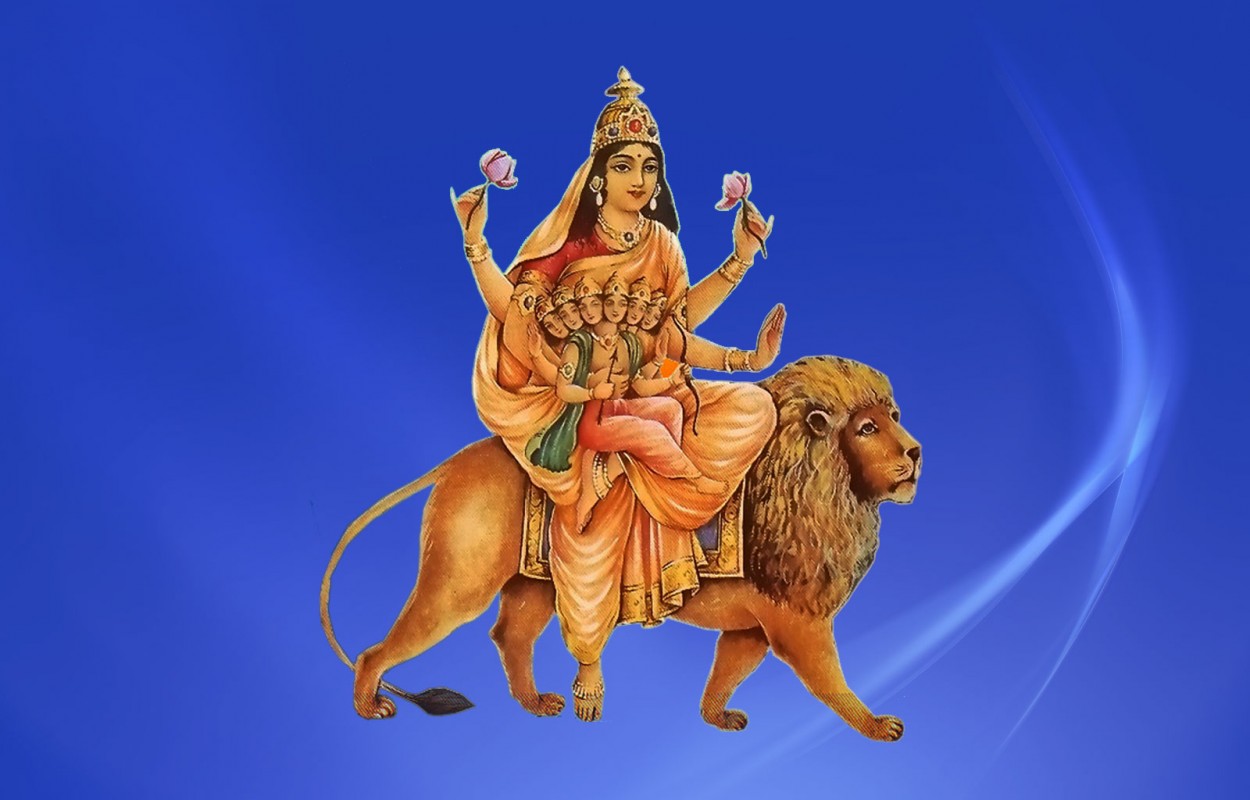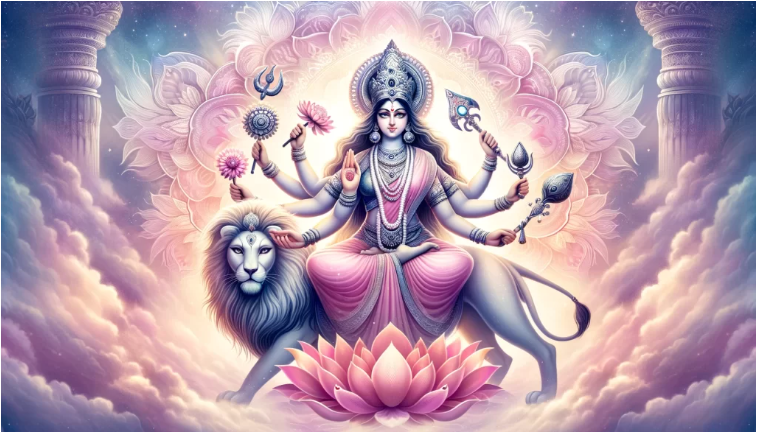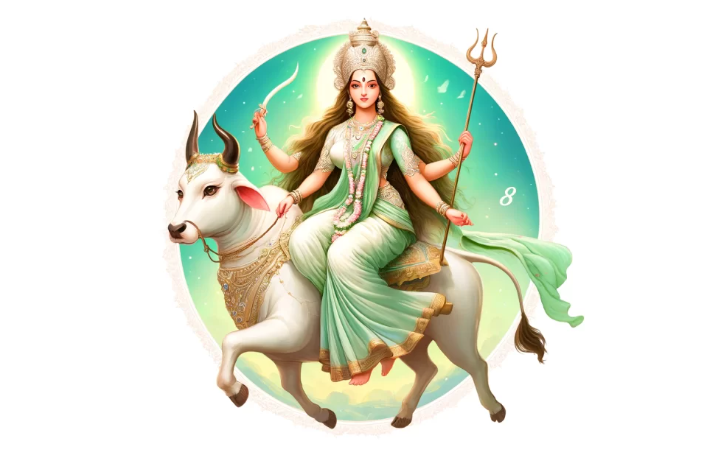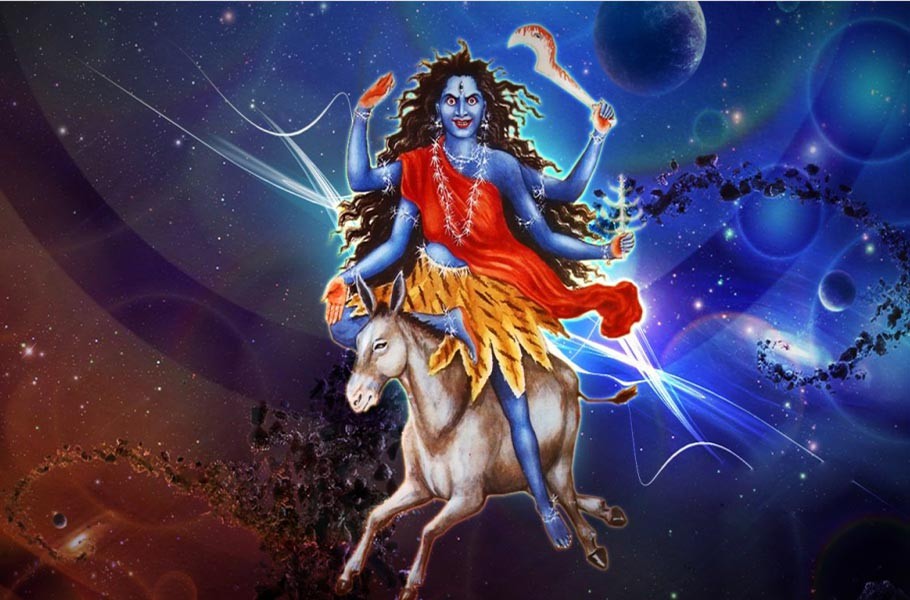The fifth day of Navratri is dedicated to Goddess Skandamata, a powerful and nurturing form of Goddess Durga, revered as the mother of Lord Kartikeya (Skanda). She embodies maternal love, compassion, and strength, making her an essential deity during this sacred festival. Worshipping her on this day is believed to bestow peace, prosperity, and protection upon her devotees.
Goddess Skandamata is celebrated for her nurturing qualities, guiding her followers on their spiritual journeys while providing them with strength and courage in the face of challenges. Her worship emphasizes the importance of maternal energy and the protective aspects of femininity.
Who is Goddess Skandamata?
Goddess Skandamata is depicted as a beautiful and serene woman, often shown seated on a lotus or a tiger, holding her infant son, Lord Kartikeya, in her lap. She is typically represented with four arms: two arms cradle her child, while the other two hold a lotus flower and a bell. Her calming presence radiates maternal love, symbolizing the nurturing aspects of motherhood combined with the strength to overcome adversities.
The image of Goddess Skandamata evokes feelings of compassion and protection, making her a beloved figure among devotees who seek her blessings for familial harmony and spiritual growth.
The Symbolism of Goddess Skandamata
Goddess Skandamata’s iconography is rich in symbolism:
- Infant Kartikeya: Holding her son symbolizes the nurturing qualities of motherhood, representing protection, love, and guidance.
- Lotus Flower: The lotus represents purity and spiritual awakening, signifying the blossoming of consciousness and the elevation of the soul.
- Bell: The bell signifies the call to spirituality and the importance of devotion in achieving enlightenment and inner peace.
- Calm Expression: Her serene demeanor reflects tranquility and the balance of power and compassion, encouraging devotees to seek inner peace amidst life’s challenges.
The Story of Goddess Skandamata
The legend of Goddess Skandamata is intertwined with that of her son, Lord Kartikeya. According to Hindu mythology, when the demons led by the powerful Mahishasura caused havoc in the world, the gods prayed to Goddess Durga for help. In response, she manifested as Skandamata and gave birth to Lord Kartikeya, who would ultimately defeat Mahishasura.
This divine birth represents the triumph of good over evil and underscores the nurturing role of mothers in fostering strength and valor in their children. Goddess Skandamata’s story exemplifies the protective and transformative aspects of motherhood, showcasing the profound bond between a mother and her child.
Rituals and Traditions on the Fifth Day of Navratri
On the fifth day of Navratri, devotees engage in various rituals and traditions to honor Goddess Skandamata, seeking her blessings for peace, prosperity, and familial well-being.
1. Fasting and Offerings
Many devotees observe fasts on this day, dedicating themselves to spiritual practices and self-discipline. Fasting may range from consuming only fruits and light meals to complete abstinence from food.
Devotees prepare special offerings, including kheer (rice pudding), laddus, and fresh fruits, to honor the goddess and express their devotion.
2. Chanting and Prayers
Devotees recite mantras and prayers dedicated to Goddess Skandamata to invoke her blessings and energy. The most common mantra for her worship is:
“Om Devi Skandamatayai Namah”
Chanting this mantra is believed to bring peace, prosperity, and spiritual growth to those who seek her divine guidance.
3. Decorating the Altar
The altars are adorned with vibrant flowers, particularly red and white, symbolizing purity and love. Lamps and candles are lit to illuminate the space, representing the dispelling of darkness and inviting the goddess’s nurturing energy into their homes.
The Spiritual Significance of Worshipping Skandamata
The fifth day of Navratri, dedicated to Goddess Skandamata, holds deep spiritual significance. Her worship serves as a reminder of the nurturing power of motherhood and the importance of compassion, protection, and inner strength.
1. Maternal Love and Protection
Goddess Skandamata symbolizes the unconditional love and protection of a mother. Worshipping her encourages devotees to foster love and care within their families, promoting harmony and unity.
2. Spiritual Growth and Guidance
Her blessings are believed to guide devotees on their spiritual journeys, encouraging them to seek inner peace, wisdom, and enlightenment. Skandamata inspires individuals to nurture their spiritual selves while balancing their earthly responsibilities.
3. Empowerment through Compassion
Worshipping Goddess Skandamata highlights the significance of compassion and empathy. It reminds devotees that strength is not only found in power but also in the ability to care for others and uplift those in need.
Celebrations Across India
The fifth day of Navratri is celebrated with devotion and enthusiasm across various regions of India, each adding unique cultural elements to the festivities.
- In North India, devotees visit temples dedicated to Goddess Durga, where special prayers and rituals are performed in honor of Skandamata.
- In Gujarat, the traditional Garba dances and cultural programs continue, celebrating the goddess’s energy through dance and music.
- In Maharashtra, communities come together for prayers, singing hymns, and preparing special meals to honor the goddess, creating a sense of unity and devotion.
Conclusion: Embracing Maternal Energy and Strength on the Fifth Day
The fifth day of Navratri, dedicated to Goddess Skandamata, is a celebration of maternal love, protection, and spiritual growth. As devotees honor her, they are reminded of the nurturing qualities that empower them to face life’s challenges with courage and compassion.
Goddess Skandamata serves as a powerful symbol of the divine feminine, encouraging individuals to embrace their nurturing instincts and to seek inner strength through love and compassion. As we honor her on this auspicious day, may we all find inspiration in the values of motherhood and the importance of protecting and guiding those around us.










